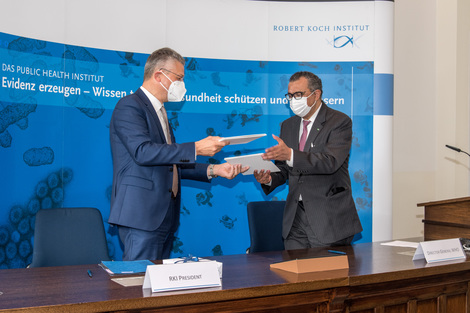ZIG RKI WHO HUB Office
- Head:
- Johanna Hanefeld
Tasks
The WHO HUB Office at the Centre for International Health Protection coordinates joint projects with the WHO Hub for Pandemic and Epidemic Intelligence, which started its work in September 2021. Both Robert Koch Institute and Charité – Universitätsmedizin Berlin have been acting as foundational partners of the WHO Hub based in Berlin. In a growing partnership, RKI scientists work with WHO and other global partners to better predict, prevent and detect global health threats and to optimise mechanisms of pandemic preparedness and response. The RKI also contributes its partnership with other national public health institutes.
The WHO Hub for Pandemic and Epidemic Intelligence aims to better address pandemic and epidemic risks in a global network. It links local, regional and global initiatives and creates a collaborative environment for experts from across a wide spectrum of disciplines. As a catalyst for innovative global solutions, the Hub wants to improve access to and efficient use of digital epidemiological data. WHO is building a global collaboration so that public health partners from around the world can benefit from cutting-edge technologies and feed in their needs.
The collaboration between the RKI and the WHO Hub is agreed in a two-year work plan including four projects. The expertise of scientists on both sides and the extensive global networks complement each other as follows:
1. A Partnership to Strengthen Integrated Genomic Surveillance through Greater Capacities in National Public Health Institutes
National capacity for infectious disease diagnostics and surveillance is essential to enable countries to respond early to disease outbreaks at national and global levels. In this project, the team works with designated partner countries on the African continent and their National Public Health Institutes to build national capacity for integrated genomic surveillance. This includes training activities on surveillance, genome sequencing and the associated bioinformatics data analysis, as well as strengthening networking between the areas and institutions involved. Through this and policy dialogues with decision-makers, the integration of genomic data into national and international structures should be discussed in order to make genomic data usable for public health decision-making.
Project outline (PDF, 2 MB, File does not meet accessibility standards.)
2. Collaboration on Public Health Intelligence Capacity Building and Innovation within the EIOS Initiative
Public Health Intelligence (PHI) is used for early detection of potential public health threats. Collaboration with other PHI teams is essential in this effort. The project aims to strengthen PHI competencies and networks at the global level by strengthening national PHI capacities. For this purpose, in addition to the development of PHI standards and training modules, technical solutions for better signal quality within the EIOS system (Epidemic Intelligence from Open Source) will be developed and expanded, and a regional PHI network will be sustainably established. The project thus promotes better, clearer and faster interaction and data evaluation at national and international level.
Project outline (PDF, 2 MB, File does not meet accessibility standards.)
3. Collaboration on Antimicrobial Resistance (AMR) and Healthcare-Associated Infections (HAIs)
Improved surveillance systems and innovative tools are needed to support the prevention and control of antimicrobial resistance and healthcare associated infections. The aim of this project is to promote global exchange and improve surveillance standards and tools. Reporting on emerging antimicrobial resistance threats will be further developed within the framework of the WHO Global Antimicrobial Resistance and Use Surveillance System (GLASS). Furthermore, the integrated surveillance of health care-associated infections (HCAI), antimicrobial resistance and antibiotic use and the collection of process indicators for infection prevention and control will be promoted. The calculation of the burden of disease due to antimicrobial resistance will be supported.
4. GOARN Berlin Fellowship Programme
The WHO Hub for Pandemic and Epidemic Intelligence works with broad and diverse partnerships, including the Global Outbreak Alert and Response Network (GOARN). By linking data, tools and communities of practice across the technical disciplines of outbreak alert and response, actionable data and insights can be shared for rapid decision-making and effective interventions to contain epidemics and pandemics. The GOARN Berlin Fellowship Programme is an initiative of the RKI WHO Collaborating Centre for GOARN, together with the WHO Hub in Berlin and the GOARN Operational Support Team (OST), to strengthen the institutional commitment, engagement and capacity of GOARN partners in this field.
Impressions from the collaboration
BilderstreckeBildVideo
1 / 7


Signing of the Memorandum of Understanding by the WHO Director-General Dr Tedros Adhanom Ghebreyesus and the former RKI president Prof Lothar H. Wieler in September 2021. Source: RKI


















